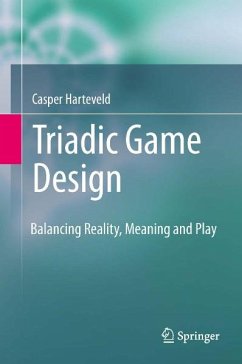Many designers, policy makers, teachers, and other practitioners are beginning to understand the usefulness of using digital games beyond entertainment. This has led to an increasing number of attempts to apply games meaningfully. Games have been developed from teaching students about history, making patients adhere in taking their medicine, to recruiting personnel for the military and collecting data to improve search engines. Yet, little is known on how to design such games. This book is one of the first to look into the fundamentals of designing any game with a serious purpose and provides a way of thinking on how to design one successfully.
Drawing on the personal design experience of the author as well as dozens of examples, the reader will be introduced to a design philosophy called "Triadic Game Design." This argues that all games involve three worlds: the worlds of Reality, Meaning, and Play. Each world is affiliated with different people, disciplines, aspects, and criteria. The philosophy also posits that a balance needs to be found within and between the three worlds. Such a balance is difficult to achieve, during the design many tensions will arise, forcing designers to make trade-offs. To deal with these tensions and to ensure that the right decisions are made to create a harmonic game, a frame of reference is needed. This is what Triadic Game Design offers. And this is what makes it an invaluable tool for practitioners and researchers who are interested in using and designing games that have a real world impact.
Drawing on the personal design experience of the author as well as dozens of examples, the reader will be introduced to a design philosophy called "Triadic Game Design." This argues that all games involve three worlds: the worlds of Reality, Meaning, and Play. Each world is affiliated with different people, disciplines, aspects, and criteria. The philosophy also posits that a balance needs to be found within and between the three worlds. Such a balance is difficult to achieve, during the design many tensions will arise, forcing designers to make trade-offs. To deal with these tensions and to ensure that the right decisions are made to create a harmonic game, a frame of reference is needed. This is what Triadic Game Design offers. And this is what makes it an invaluable tool for practitioners and researchers who are interested in using and designing games that have a real world impact.
Dieser Download kann aus rechtlichen Gründen nur mit Rechnungsadresse in A, B, BG, CY, CZ, D, DK, EW, E, FIN, F, GR, HR, H, IRL, I, LT, L, LR, M, NL, PL, P, R, S, SLO, SK ausgeliefert werden.
From the reviews:
"The book provides a wealth of references from serious games, their entertainment counterparts, and the author's own game, along with detailed discussions about issues pertaining to the triumvirate of worlds found in TGD. The appendixes offer instructions and resources for a workshop format, which can be used to convey the principles of TGD to developers or potential clients. ... Summing Up: Recommended. All levels of game design students, researchers/faculty, and professionals/practitioners." (A. Chen, Choice, Vol. 48 (11), August, 2011)
"The book provides a wealth of references from serious games, their entertainment counterparts, and the author's own game, along with detailed discussions about issues pertaining to the triumvirate of worlds found in TGD. The appendixes offer instructions and resources for a workshop format, which can be used to convey the principles of TGD to developers or potential clients. ... Summing Up: Recommended. All levels of game design students, researchers/faculty, and professionals/practitioners." (A. Chen, Choice, Vol. 48 (11), August, 2011)









